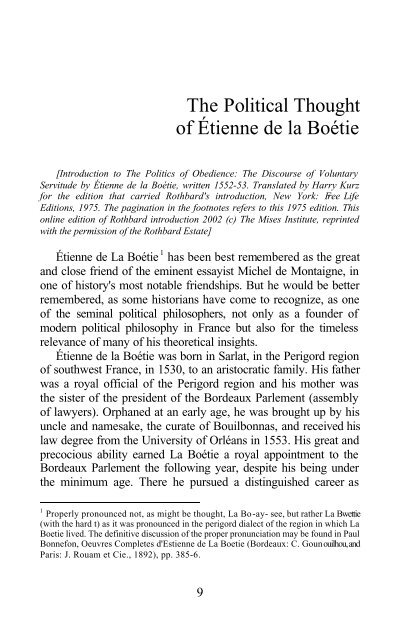You also want an ePaper? Increase the reach of your titles
YUMPU automatically turns print PDFs into web optimized ePapers that Google loves.
The Political Thought<br />
<strong>of</strong> Étienne de la Boétie<br />
[Introduction to The <strong>Politics</strong> <strong>of</strong> <strong>Obedience</strong>: The Discourse <strong>of</strong> Voluntary<br />
Servitude by Étienne de la Boétie, written 1552-53. Translated by Harry Kurz<br />
for the edition that carried Rothbard's introduction, New York: Free Life<br />
Editions, 1975. The pagination in the footnotes refers to this 1975 edition. This<br />
online edition <strong>of</strong> Rothbard introduction 2002 (c) The Mises Institute, reprinted<br />
with the permission <strong>of</strong> the Rothbard Estate]<br />
Étienne de La Boétie 1 has been best remembered as the great<br />
and close friend <strong>of</strong> the eminent essayist Michel de Montaigne, in<br />
one <strong>of</strong> history's most notable friendships. But he would be better<br />
remembered, as some historians have come to recognize, as one<br />
<strong>of</strong> the seminal political philosophers, not only as a founder <strong>of</strong><br />
modern political philosophy in France but also for the timeless<br />
relevance <strong>of</strong> many <strong>of</strong> his theoretical insights.<br />
Étienne de la Boétie was born in Sarlat, in the Perigord region<br />
<strong>of</strong> southwest France, in 1530, to an aristocratic family. His father<br />
was a royal <strong>of</strong>ficial <strong>of</strong> the Perigord region and his mother was<br />
the sister <strong>of</strong> the president <strong>of</strong> the Bordeaux Parlement (assembly<br />
<strong>of</strong> lawyers). Orphaned at an early age, he was brought up by his<br />
uncle and namesake, the curate <strong>of</strong> Bouilbonnas, and received his<br />
law degree from the University <strong>of</strong> Orléans in 1553. His great and<br />
precocious ability earned La Boétie a royal appointment to the<br />
Bordeaux Parlement the following year, despite his being under<br />
the minimum age. There he pursued a distinguished career as<br />
1 Properly pronounced not, as might be thought, La Bo-ay- see, but rather La Bwettie<br />
(with the hard t) as it was pronounced in the perigord dialect <strong>of</strong> the region in which La<br />
Boetie lived. The definitive discussion <strong>of</strong> the proper pronunciation may be found in Paul<br />
Bonnefon, Oeuvres Completes d'Estienne de La Boetie (Bordeaux: C. Gounouilhou, and<br />
Paris: J. Rouam et Cie., 1892), pp. 385-6.<br />
9


